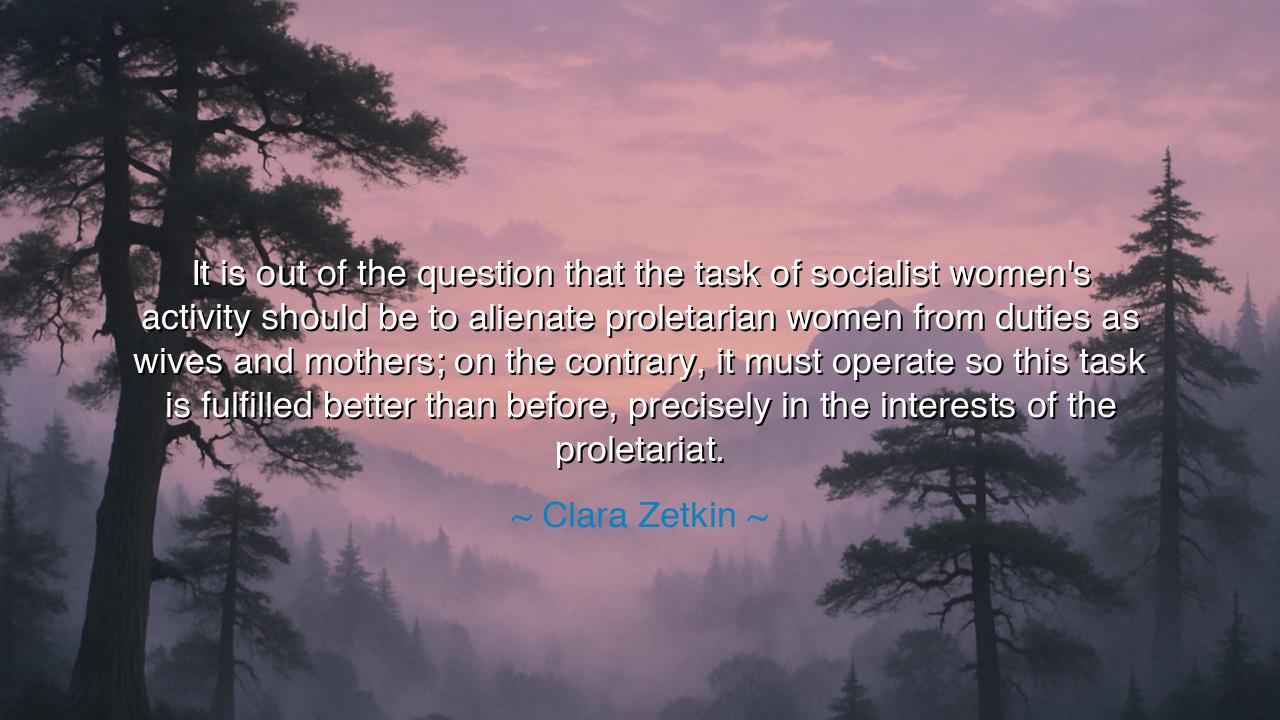
It is out of the question that the task of socialist women's
It is out of the question that the task of socialist women's activity should be to alienate proletarian women from duties as wives and mothers; on the contrary, it must operate so this task is fulfilled better than before, precisely in the interests of the proletariat.






Hear, O children of the working earth, the steadfast words of Clara Zetkin: “It is out of the question that the task of socialist women’s activity should be to alienate proletarian women from duties as wives and mothers; on the contrary, it must operate so this task is fulfilled better than before, precisely in the interests of the proletariat.” This is no casual remark, but the voice of one who labored in the furnace of struggle, seeking to unite the liberation of women with the cause of the working class. In her wisdom, Zetkin declared that the dignity of womanhood must not be torn from its roots, but strengthened so that both family and society may be uplifted.
For she saw that the proletarian woman bore a double burden: to work beside men in factories, and to care for husband and children in the home. To abandon these duties was impossible, for life itself demanded them. Yet to shoulder them alone, without support or recognition, was a form of oppression. Thus, Zetkin taught that the movement must not despise motherhood, but transform it—bringing aid, solidarity, and justice so that women might fulfill their roles not as slaves, but as equals in the struggle.
History bears out her vision. In the early years of the socialist movement, women were often told their liberation meant only entry into the workplace, while their domestic burdens remained unchanged. But Zetkin, like her comrade Rosa Luxemburg, saw deeper: liberation must not divide woman from her identity as mother and wife, but must reshape society so that these roles were honored, supported, and freed from chains. Childcare, education, and social reforms, she argued, were as essential as the ballot or the wage.
Consider also the example of Sparta in ancient Greece, where women were given greater strength and freedom than elsewhere, not because they were freed from motherhood, but because their society believed strong mothers forged strong warriors. Zetkin’s vision, though rooted in socialism, echoes this ancient truth: that the nurturing of life is not a hindrance to liberation, but part of its foundation, when supported by the community.
Therefore, O seekers of wisdom, let this be the teaching: the task of women’s activity is not to scorn the duties of life, but to fulfill them in freedom, dignity, and strength. A society that uplifts its women, that shares their burdens and honors their labor both in the home and beyond it, is a society that will endure. Zetkin’s words endure as a reminder that the liberation of one is bound to the liberation of all, and that the future of the proletariat rests upon the strength of its women.






HNNguyen Hien Nhi
The quote suggests that women’s activities in socialist movements should enhance their role within the home, improving the quality of their work as wives and mothers. This seems to imply that the family unit is a cornerstone of socialist values. But can such a viewpoint ignore the struggles of women who are attempting to balance both their familial duties and career ambitions? Could this ideal unintentionally perpetuate outdated gender norms?
YTYen Tan
Zetkin seems to emphasize that the role of women as wives and mothers is vital to the proletariat, which raises an interesting point about how gender roles are tied to economic systems. But how does this relate to today’s struggles for gender equality? Is the focus on domesticity limiting or empowering for working-class women who are seeking broader societal and career roles?
THPHAM THI HA
Clara Zetkin's statement challenges the traditional view that socialism requires radical changes in gender roles. She argues that socialist women's activism should improve the domestic role of women without undermining it. However, isn't there a risk that this reinforces the idea that women's primary role is in the home? Can we truly empower women if we still view their domestic duties as their central societal contribution?
TTnguyen thi thao
This quote seems to suggest that socialist movements shouldn't seek to change women's roles as mothers or wives but instead help them fulfill these roles more effectively. But can this perspective seem limiting to some modern feminist ideas that emphasize women's autonomy outside traditional domestic roles? Is it possible to balance women's societal roles with their personal aspirations in a way that respects both individual freedoms and collective welfare?